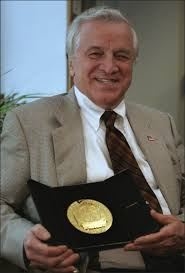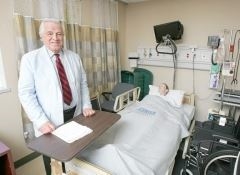 |
| A portrait of Dr.Dudrick (https://www.google.com/url?sa=i&rct=j&q=&esrc=s&source=images&cd=&cad=rja&uact=8&ved=0ahUKEwjmlJONp6) |
The amazing thing about the medical world is it is always advancing. Less than half a century ago countless people would pass away from starvation or not being able to distribute medication quickly enough in their body after surgery or birth. Then Dr. Stanley J. Dudrick created a Central Line and Total Parenteral Nutrition which solved these problems. I first discovered him by researching heroes in the medical world. When his name popped up I couldn't stop reading. I have always wanted to help others and make an impact to the world. Although I am only a high school student I am positive I want to become a surgeon like him so I can plan exactly how to achieve it.
Surgery is a well-known career but many people don't know much about it. It takes a long time to become a surgeon because you have to go through four years of undergraduate school, four years of medical school, and then three to eight years of internship and residency. According to the U.S. Bureau of Labor Statistics, surgeons are paid well: in 2012, their annual average salary was $396,233 a year which is huge in comparison to the $35,000 average job pay in other careers. The medical field also includes optometrists, physician assistants, podiatrists, registered nurses, dentists, and a veterinarians. There are constantly new developments in medicine and technique. In just 2015 science advanced with the creation of things such as an immune checkpoint inhibitor which helps the immune system fight cancer and the dengue vaccine that prevents people from getting the dengue virus.
Stanley J. Dudrick, M.D was born in 1935 in Nanticoke, Pennsylvania. Growing up he had been a hard worker spending 60-hour weeks of manual labor working on his grandfather's farm. Luckily, he always had great role models around him and focused greatly on his education as well as being kind and friendly to others. All of which are qualities that make a doctor great. He admired the work of a couple doctors who came to help his sick mother and inspired him to go into the profession himself. In an interview that can now be found on the JAMA Surgery website Archives of Surgery, Dudrick states he went to Franklin & Marshall College but when that he tried to get into medical school at Penn there was a note saying that no matter what, if he wanted to go there then he would be accepted without a problem. This was because he had visited the college four years prior and had such a good interview with the dean that he was promised acceptance into Penn. After going through medical school one thing had always bothered Dudrick and it was that even after extremely successful surgeries, many patients died anyway because they were not getting enough nutrition. He devoted his work to finding a solution to this problem which was a long aggravating process. Bits of information about Total Parental Nutrition and Central Line were constantly being published and shared with the world so one specific date cannot be given. Dudrick has devoted himself to saving lives through surgery and teaching others not only of medicine, but also of wisdom.
 |
| Dr. Dudrick working (http://citizensvoice.com/news/charitable-doctor-will-teach-at-misericordia-1.1349933) |
This incredible individual spent all his time an effort into his work which led to the creation of Total Parental Nutrition and Central Line. With the creation of the modern TPN, patients can have nutrients and water supplied to their bloodstream without any problems. This saves not only post-op patients, but also babies with health problems that require them to need food given to them because they cannot get it themselves. Examples of this are babies born prematurely that have not developed the skills to properly digest. Nutrients are supplied directly to their blood which saves countless from starvation. A central venous catheter works nearly the same way. It is used to "clean up" vines and distribute medicine quickly through out a patient's bloodstream. Both TPN and CL are used constantly and have resulted in countless lives being saved. An inspiring quote of Dr. Dudrick that he said in an interview for the article For Patients Who Can't Eat: "That's what I'm hoping for. I want to leave something better behind when I go," which shows a valuable lesson that it is important to make the world a better place.
Dr. Dudrick's story inspires me to become not only a doctor but the best one possible. To prepare for this career, I will, of course, not only have to take advanced classes like ROP and AP in high school, but also I will take anatomy and volunteer at a hospital so I can be up-to-speed for college. Once in college I plan to major in premed and volunteer with the Red Cross to help aid those who are injured. My passion to help others and improve the world is what will ultimately set me apart from my peers in the field. I trust that like Stanley Dudrick, M.D., my personal success will be founded upon service to others.
Page created on 1/17/2016 12:00:00 AM
Last edited 1/17/2016 12:00:00 AM
Demaret, Kent. "For Patients Who Can''t Eat, Dr. Stanley Dudrick''s Intravenous Feeding System Is a Lifeline." [Online] Available http://www.people.com/people/archive/article/0,,20071854,00.html. Demaret.
Department of Labor, U.S. "Occupational Outlook Handbook." [Online] Available http://www.bls.gov/ooh/healthcare/physicians-and-surgeons.htm. Department of Labor.
Sanchez, Juan A. "ORAL HISTORY PROJECT: Stanley J. Dudrick." [Online] Available https://www.aap.org/en-us/about-the-aap/Pediatric-History-Center/Documents/Dudrick.pdf. Sanchez.
Clinic, Cleveland. "Top 10 Medical Innovations for 2015." [Online] Available http://innovations.clevelandclinic.org/Summit-(1)/Top-10-Innovations/Top-10-for-2015.aspx#.VpYJnyRH3. Clinic.
